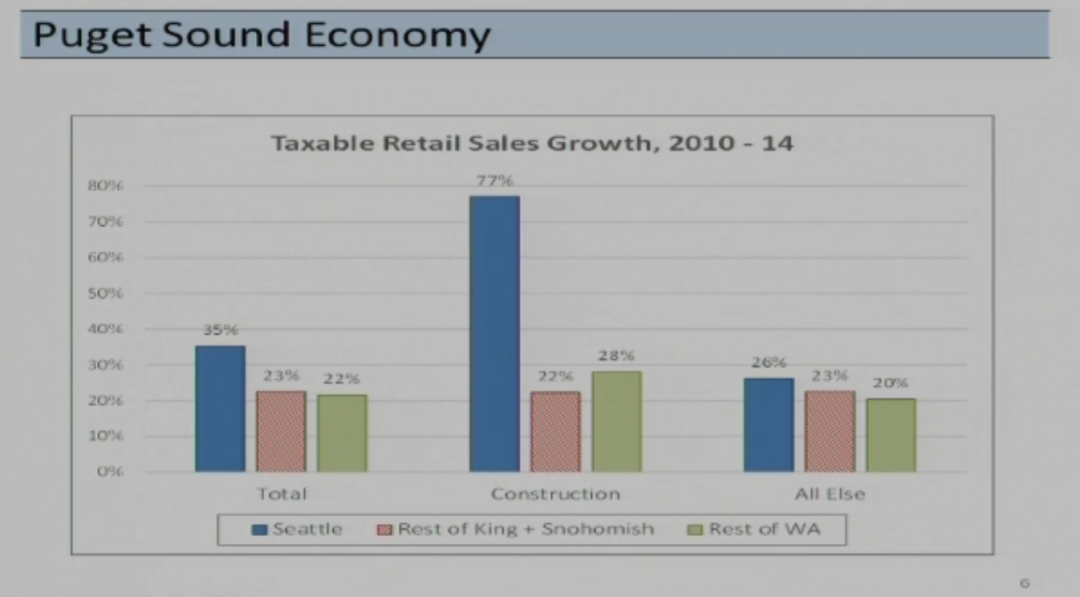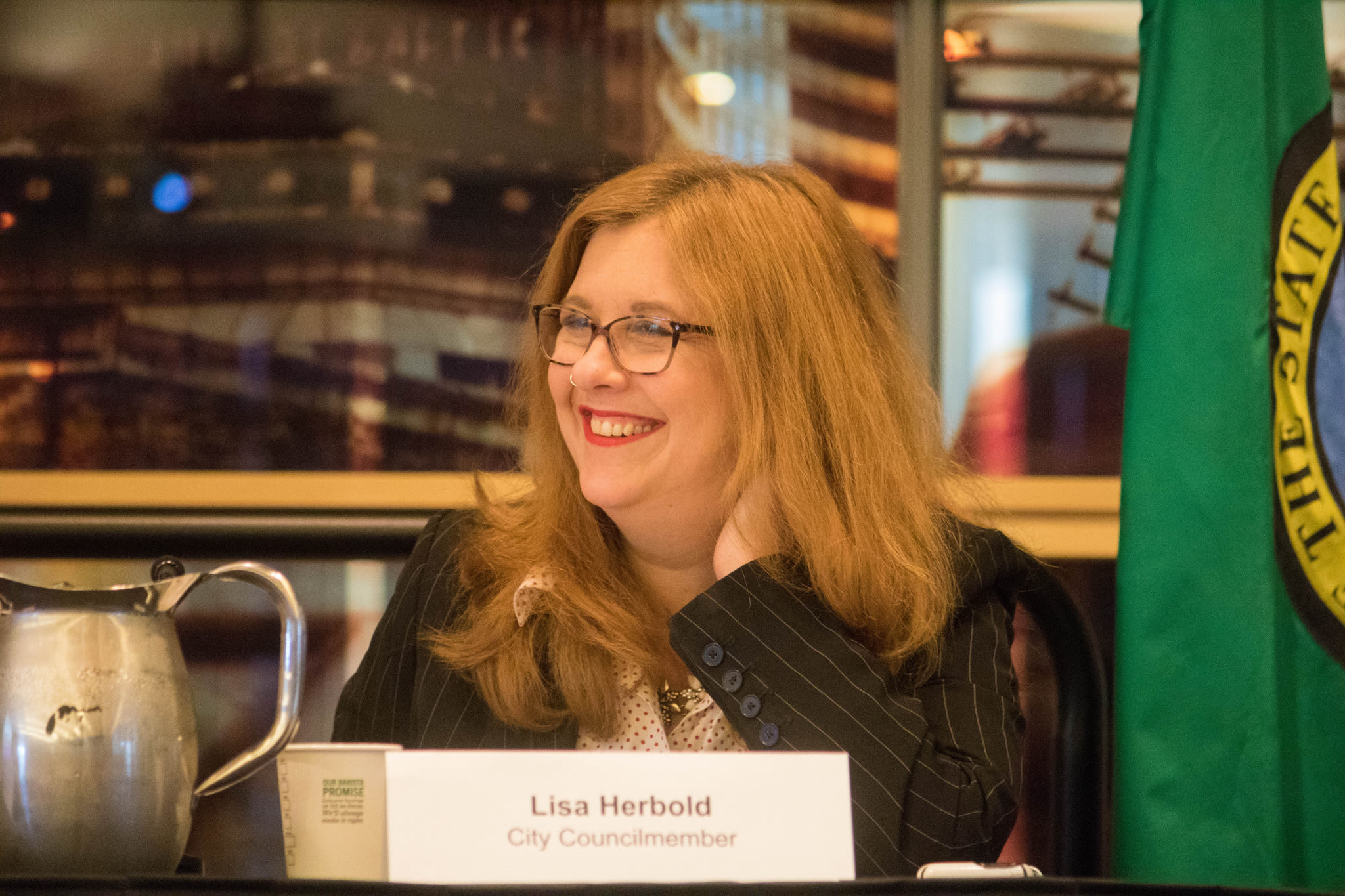Amazon and Boeing Creating 43 Percent of Local Jobs

1. The city’s budget office presented an update to city council yesterday on the state of the robust local economy. The Seattle metro area has seen 15.5 percent employment growth since 2010 compared to 12.5 percent in Washington state and 9.7 percent in the U.S. overall.
The driving force has been Amazon and Boeing: Forty-three percent of the job growth in the Puget Sound is from those two corporations (with an average wage of $100,000). This doesn’t mean 43 percent of the new jobs are literally coming from the heavyweights, but, with secondary and tertiary jobs specifically tied to them, the budget office traced all that job growth back to the new, high wage jobs at those companies. (At that point in the presentation, council member Sally Bagshaw reminded her colleagues of an idea that had been presented to the council last month—by the same economists who had crunched the data for yesterday’s budget office slides—the “10.1 percent solution,” a local income tax. Council president Tim Burgess, however, reminded Bagshaw that “99 percent” of making good on that recommendation was in the hands of state legislators.)
If the job stats don’t make you like the evil Amazon just a little bit, there’s also this related stat: Sales tax growth in Seattle is up 35 percent since 2010 compared to 23 percent in the rest of the metro area and 22 percent in the state. And construction (think Amazon condos) is clearly driving Seattle’s hot stats. Breaking down the 35 percent number: Construction sales tax growth is up 77 percent since 2010.

Saying construction tax revenue is at “a high point” since the 1970s (that’s as far back as their data went) and perhaps “unprecedented,” the budget office said that that 25 percent of the city’s sales tax and 10 percent of the city’s B&O tax (for a 17 percent total) came from construction.
The report tempered the news with a slide showing the historic volatility of construction tax revenues as budget director Ben Noble warned that relying on construction taxes created “uncertainty.” However, the two-year forecast showed that, while the growth wouldn’t continue, it wouldn’t fall either, remaining flat (at its historic highs).
2. We’re hearing about some city council race push polling in the field against District One (West Seattle) candidate Lisa Herbold, the longtime Nick Licata aide who’s running against King County Joe McDermott aide Shannon Braddock.
The poll, reportedly from EMC, apparently tests favorability ratings on progressive Licata, Democrat McDermott, and socialist council member Kshama Sawant. Then, after asking if the voter planned to go with Herbold or Braddock, the poll pushed out some messages about Herbold to those who said they planned to vote for her. For example: Would you still vote for her if you knew she stands with Sawant? Would you still vote for her if you knew she wants to bring Sawant’s socialist agenda to West Seattle. Would you still vote for her knowing that she's been at city hall for 17 years and hasn't done anything for West Seattle?
I’ll have to wait to see the latest campaign finance reports to find out if the push polling was paid for by Braddock herself or the chamber/landlord-funded independent expenditure group that backed Braddock in the primary.
UPDATE: Braddock tells me: "This poll is not from my campaign and it's a good example of why I support [I-122] to bring the transparency to our elections that the Supreme Court has blocked. I look forward to continuing my campaign focusing on the issues that matter to District 1 residents."
3. Speaking of independent expenditures: Mysterious yard signs supporting District Four (Wallingford, U District, Wedgwood, Sand Point) candidate Michael Maddux popped up last week.
Maddux, who came into the Seattle Met offices yesterday for an endorsement interview, told us he didn't put up the signs.
"They are not mine," he said. "I don’t know where they came from. That’s not my brand. That’s not us. Frankly, they’re not the best looking signs in the world. And they don’t have the union bug which really pisses me off. I’ve already reported it to the Seattle Ethics and Elections Commission. I don’t want IEs on my behalf. I’m adamantly opposed to IEs in general."
Criticizing the infamous U.S. Supreme Court Citizens United ruling that allows unlimited corporate spending (which was already allowed in Washington State pre-Citizens, by the way, though it has also masked donors), Maddux added: "I don't believe money is speech. I think we should be able to have a conversation between the candidates. Make your contribution to the candidate and let them control their own message. I don’t think IEs are helpful. They’re bad for the branding."
Maddux's opponent, Rob Johnson, is being supported by an IE backed by the chamber, landlords, and the Washington Restaurant Association, who Maddux pointed out sued Seattle over the $15 minimum wage. Johnson hasn't condemned his IEs, telling us that they reflected his ability to attract a broad base of support. For his part, Maddux told us: "I haven't had to defend any that are for me."
4. Sawant-challenger, Urban League leader Pamela Banks picked up the 37th Legislative District (Southeast Seattle) endorsement this week beating out the de facto Sawant "No Endorsement" option; Sawant herself isn't eligible because she's not a Democrat. The 37th also went with city council president Tim Burgess over left wing challenger Jon Grant.
5. Speaking of Burgess, we had him in for an endorsement interview yesterday as well. One interesting bit of HALA/council/legislative news we picked up: Contrary to what land use committee chair Mike O'Brien told us, Burgess said the council planned to revisit the new restrictions on pod apartments that O'Brien ushered through council.
Stats show that pod apartment permitting has fallen off by 97 percent since the regs kicked in and the HALA report recommended revisiting O'Brien's legislation.
6. Finally, in some media gossip news: Longtime Crosscut state legislature reporter John Stang has quit. Stang, a nerd-level beat reporter, reportedly had editorial disagreements with Crosscut's new editor Greg Hanscom who Stang described as an "abstract, cosmic-level guy."



